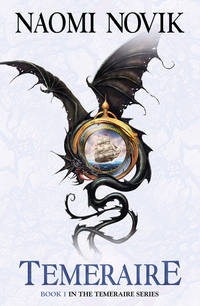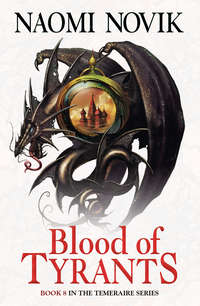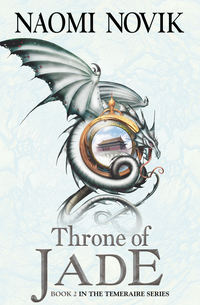
Полная версия
Black Powder War
It was difficult to know how to address him: neither a superior servant, nor a gentleman, nor a native, all his refinements of speech curiously placed against the scruff and tumble of his clothing and his disreputable surroundings; though perhaps he could have gotten no better accommodations, curious as his appearance was, and with the hostile eagle as his companion. He made no concessions, either, to his odd, in-between station; a certain degree of presumption almost in his manner, less formal than Laurence would himself have used to so new an acquaintance, almost in active defiance against being held at a servant’s distance.
But Tharkay answered their many questions readily enough, and having fed his eagle and set it aside, hooded, to sleep, he even opened up the kit which had carried him there so that they might inspect the vital equipment: a special sort of desert tent, fur-lined and with leather-reinforced holes spaced evenly along the edges, which he explained could be lashed quickly together with similar tents to form a single larger sheet to shield a camel, or in larger numbers a dragon, against sandstorm or hail or snow. There was also a snug leather-wrapped canteen, well-waxed to keep the water in, and a small tin cup tied on with string, marks engraved into it halfway and near the rim; a neat small compass, in a wooden case, and a thick journal full of little hand-sketched maps, and directions taken down in a small, neat hand.
All of it showed signs of use and good upkeep; plainly he knew what he was about, and he did not show himself overeager, as Riley had feared, for their custom. ‘I had not thought of returning to Istanbul,’ Tharkay said instead, when Laurence at last came around to inquiring if he would be their guide. ‘I have no real business there.’
‘But have you any elsewhere?’ Granby said. ‘We will have the devil of a time getting there without you, and you should be doing your country a service.’
‘And you will be handsomely paid for your trouble,’ Laurence added.
‘Ah, well, in that case,’ Tharkay said, a wry twist to his smile.
‘Well, I only wish you may all not have your throats slit by Uygurs,’ Riley said in deep pessimism, giving up, after he had tried once more at dinner to persuade them to remain. ‘You will dine with me on board tomorrow, Laurence?’ he asked, stepping into his barge. ‘Very good. I will send over the raw leather, and the ship’s forge,’ he called, his voice drifting back over the sound of the oars dipping into the water.
‘I will not let anyone slit your throats at all,’ Temeraire said, a little indignantly. ‘Although I would like to see an Uygur; is that a kind of dragon?’
‘A kind of bird, I think,’ Granby said; Laurence was doubtful, but he did not like to contradict when he was not sure himself.
‘Tribesmen,’ Tharkay said, the next morning.
‘Oh.’ Temeraire was a little disappointed; he had seen people before. ‘That is not very exciting, but perhaps they are very fierce?’ he asked hopefully.
‘Have you enough money to buy thirty camels?’ Tharkay asked Laurence, after he had finally escaped a lengthy interrogation as to the many other prospective delights of their journey, such as violent sandstorms and frozen mountain passes.
‘We are going by air,’ Laurence said, confused. ‘Temeraire will carry us,’ he added, wondering if Tharkay had perhaps misunderstood.
‘As far as Dunhuang,’ Tharkay said equably. ‘Then we will need to buy camels. A single camel can carry enough water for a day, for a dragon of his size; and then of course he can eat the camel.’
‘Are such measures truly necessary?’ Laurence said, in dismay at losing so much time: he had counted on crossing the desert quickly, on the wing. ‘Temeraire can cover better than a hundred miles in a day at need; surely we can find water over such an expanse.’
‘Not in the Taklamakan,’ Tharkay said. ‘The caravan routes are dying, and the cities die with them; the oases have mostly failed. We ought to be able to find enough for us and the camels, but even that will be brackish. Unless you are prepared to risk his dying of thirst, we carry our own water.’
This naturally putting a period to any further debate, Laurence was forced to apply to Sir Thomas for some assistance in the matter, having had no expectation, on his departure from England, that his ready funds should need to stretch to accommodate thirty camels and supplies for an overland journey. ‘Nonsense, it is a trifle,’ Staunton said, refusing his offered note of hand. ‘I dare say I will have cleared fifty thousand pounds in consequence of your mission, when all is said and done. I only wish I did not think I was speeding you on the way to your destruction. Laurence, forgive me for making so unpleasant a suggestion; I would not like to plant false suspicions in your head, but the possibility has been preying on me since you decided upon going. Could the letter by any chance have been forged?’
Laurence looked at him in surprise, and Staunton went on, ‘Recall that the orders, if honest, must have been written before news of your success here in China reached England— if indeed that news has reached them yet. Only consider the effect upon the negotiations so lately completed if you and Temeraire had unceremoniously gone away in the midst of them: you would have had to sneak out of the country like thieves to begin with, and an insult of such magnitude would surely have meant war. I am hard-pressed to imagine any reason the Ministry should have sent such orders.’
Laurence sent for the letter and for Granby; together they studied it fresh in the strong sunlight from the east-facing windows. ‘I am damned if I am any judge of such things, but it seems Lenton’s hand to me,’ Granby said doubtfully, handing it back.
To Laurence also; the letters were slant and wavering, but this kind of affliction, he did not say to Staunton, was not uncommon; aviators were taken into service at the age of seven, and the most promising among them often became runners by ten, with studies neglected sadly in favour of practical training: his own young cadets were inclined to grumble at his insistence that they should learn to write a graceful hand and practice their trigonometry.
‘Who would bother with it, any road?’ Granby said. ‘That French ambassador hanging about Peking, De Guignes— he left even before we did, and by now I expect he is halfway to France. Besides, he knows well enough that the negotiations are over.’
‘There might be French agents less well-informed behind it,’ Staunton said, ‘or worse, with knowledge of your recent success, trying to lure you into a trap. Brigands in the desert would hardly be above taking a bribe to attack you, and there is something too convenient in the arrival of this message, just when the Allegiance has been damaged, and you are sure to be chafing at your enforced delay.’
‘Well, I make no secret I had as lief go myself, for all this nay-saying and gloom,’ Granby said, as they walked back to their residence: the crew had already begun the mad scramble of preparation, and haphazard bundles were beginning to be piled upon the beach. ‘So it may be dangerous; we are not nursemaids to a colicky baby, after all. Dragons are made to fly, and another nine months of this sitting about on deck and on shore will be the ruin of his fighting-edge.’
‘And of half the boys, if they have not been spoilt already,’ Laurence said grimly, observing the antics of the younger officers, who were not entirely reconciled to being so abruptly put back to work, and engaging in more boisterous behaviour than he liked to see from men on duty.
‘Allen,’ Granby called sharply, ‘mind your damned harness-straps, unless you want to be started with them.’ The hapless young ensign had not properly buckled on his flying-harness, and the long carabiner straps were dragging on the ground behind him, bidding fair to trip him and any other crewman who crossed his path.
The ground-crew master Fellowes and his harness-men were still labouring over the flying rig, not yet repaired after the fire: a good many straps stiff and hard with salt, or rotted or burnt through, which needed replacing; too, several buckles had twisted and curled from the heat, and the armourer Pratt panted over his makeshift forge on shore as he pounded them straight and flat once more.
‘A moment, and I will see,’ Temeraire said, when they had put it on him to try, and leapt aloft in a stinging cloud of sand. He flew a small circuit and landed, directing the crew, ‘Pray tighten the left shoulder-strap a little, and lengthen the crupper,’ but after some dozen small adjustments he pronounced himself satisfied with the whole.
They laid it aside while he had his dinner: an enormous horned cow spit-roasted and dressed with heaps of green and scarlet peppers with blackened skins, and also a great mound of mushrooms, which he had acquired a taste for in Capetown; meanwhile Laurence sent his men to dinner and rowed over to the Allegiance to have a final meal with Riley, convivial though quiet; they did not drink very much, and afterwards Laurence gave him a last few letters for his mother and for Jane Roland, the official post having already been exchanged.
‘Godspeed,’ Riley said, seeing him down the side; the sun was low and nearly hidden behind the buildings of the town as Laurence was rowed back to shore. Temeraire had nibbled the last of the bones clean, and the men were coming out of the house. ‘All lies well,’ Temeraire said, when they had rigged him out once more, and then the crew climbed aboard, latching their individual harnesses onto Temeraire’s with their locking carabiners.
Tharkay, his hat buttoned on with a strap under the chin, climbed easily up and tucked himself away near Laurence, close to the base of Temeraire’s neck; the eagle, hooded, was in a small cage strapped against his chest. Abruptly from the Allegiance came the sudden thunder of cannon-fire: a formal salute, and Temeraire roared out gladly in answer while the flag-signal broke out from the mainmast: fair wind. With a quick bunching of muscle and sinew, a deep hollow rushing intake of breath beneath the skin, all the chambers of air swelling out wide, Temeraire was aloft, and the port and the city went rolling away beneath him.
Chapter Two
They went quickly, very quickly; Temeraire delighting in the chance to stretch his wings for once with no slower companions to hold him back. Though Laurence was at first a little cautious, Temeraire showed no sign of overexertion, no heat in the muscles of his shoulders, and after the first few days Laurence let him choose the pace as he wished. Baffled and curious officials came hurrying out to meet them whenever they came down for some food near a town of sufficient size, and Laurence was forced on more than one occasion to put on the heavy golden dragon-robes, the Emperor’s gift, to make their questions and demands for paperwork subside into a great deal of formal bowing and scraping: though at least he did not need to feel improperly dressed, as in his makeshift green coat. Where possible they began to avoid settlements, instead buying Temeraire’s meals directly from the herdsmen out in the fields, and sleeping nightly in isolated temples, wayside pavilions, and once an abandoned military outpost with the roof long fallen in but the walls still half-standing: they stretched a canopy made of their lashed-together tents over the remnants, and built their fire with the old shattered beams for tinder.
‘North, along the Wudang range, to Luoyang,’ Tharkay said. He had proven a quiet and uncommunicative companion, directing their course most often with a silent pointing finger, tapping on the compass mounted upon Temeraire’s harness, and leaving it to Laurence to pass the directions on to Temeraire. But that night he sketched at Laurence’s request a path in the dirt as they sat outside by the fire, while Temeraire peered down interestedly ‘And then we turn west, towards the old capital, towards Xian.’ The foreign names meant nothing to Laurence, every city spelled seven different ways on his seven different maps, which Tharkay had eyed sidelong and disdained to consult. But Laurence could follow their progress by the sun and the stars, rising daily in their changed places as Temeraire’s flight ate up the miles.
Towns and villages one after another, the children running along the ground underneath Temeraire’s racing shadow, waving and calling in high indistinct voices until they fell behind; rivers snaking below them and the old sullen mountains rising on their left, stained green with moss and girt with reluctant clouds unable to break free from the peaks. Dragons passing by avoided them, respectfully descending to lower ranks of the air to give way to Temeraire, except once one of the greyhound-sleek Jade Dragons, the imperial couriers who flew at heights too cold and thin for other breeds, dived down with a cheerful greeting, flitting around Temeraire’s head like a hummingbird, and as quickly darted up and away again.
As they continued north, the nights ceased to be so stiflingly hot and became instead pleasantly warm and domestic; hunting plentiful and easy even when they did not come across one of the vast nomadic herds, and good forage for the rest of them. With less than a day’s flight left to Xian, they broke their travelling early and encamped by a small lake: three handsome deer were set to roasting for their dinner and Temeraire’s, the men meanwhile nibbling on biscuit and some fresh fruit brought them by a local farmer. Granby sat Roland and Dyer down to practice their penmanship by the firelight while Laurence attempted to make out their attempts at trigonometry. These, having been carried out mid-air and with the slates subject to all the force of the wind, posed quite a serious challenge, but he was glad to see at least their calculations no longer produced hypotenuses shorter than the other sides of their triangles.
Temeraire, relieved of his harness, plunged at once into the lake: mountain streams rolled down to feed it from all sides, and its floor was lined with smooth tumbled stones; it was a little shallow now on the cusp of August, but he managed to throw water over his back, and he frolicked and squirmed over the pebbles with great enthusiasm. ‘That is very refreshing; but surely it must be time to eat now?’ he said as he climbed out, and looked meaningfully at the roasting deer; but the cooks waved their enormous spit-hooks at him threateningly, not yet satisfied with their work.
He sighed a little and shook out his wings, spattering them all with a brief shower that made the fire hiss, and settled himself down upon the shore next to Laurence. ‘I am very glad we did not wait and go by sea; how lovely it is to fly straight, as quickly as one likes, for miles and miles,’ he said, yawning.
Laurence looked down; certainly there was no such flying in England: a week such as the last would have seen them from one end of the isles to the other and back. ‘Did you have a pleasant bathe?’ he asked, changing the subject.
‘Oh, yes; those rocks were very nice,’ Temeraire said, wistfully, ‘although it was not quite as agreeable as being with Mei.’
Lung Qin Mei, a charming Imperial dragon, had been Temeraire’s intimate companion in Peking; Laurence had feared since their departure that Temeraire might privately be pining for her. But this sudden mention seemed a non sequitur, nor did Temeraire seem very love-lorn in his tone. Then Granby said, ‘Oh, dear,’ and stood up to call across the camp, ‘Mr. Ferris! Mr. Ferris, tell those boys to pour out that water, and go and fetch some from the stream instead, if you please.’
‘Temeraire!’ Laurence said, scarlet with comprehension.
‘Yes?’ Temeraire looked at him, puzzled. ‘Well, do you not find it more pleasant to be with Jane, than to—’
Laurence stood up hastily, saying, ‘Mr. Granby, pray call the men to dinner now,’ and pretended not to hear the unsteady stifled mirth in Granby’s voice as he said, ‘Yes, sir,’ and dashed away.
Xian was an ancient city, the former capital of the nation and full of the memory of glory, the thin scattering of carts and travellers lonely on the wide and weed-choked roads leading in to the city; they flew over high moated walls of grey brick, pagoda towers standing dark and empty, only a few guards in their uniforms and a couple of lazy scarlet dragons yawning. From above, the streets quartered the city into chessboard squares, marked with temples of a dozen descriptions, incongruous minarets cheek by jowl with the sharp-pointed pagoda roofs. Narrow poplars and old, old pines with fragile wisps of green needles lined the avenues, and they were received in a marble square before the main pagoda by the magistrate of the city, officials assembled and bowing in their robes: news of their approach was outrunning them, likely on the wings of the Jade Dragon courier. They were feasted on the banks of the Wei river in an old pavilion overlooking rustling wheat fields, on hot milky soup and skewers of mutton, three sheep roasted together on a spit for Temeraire, and the magistrate ceremonially broke sprigs of willow in farewell as they left: wishes for a safe return.
Two days later they slept near Tianshui in caves hollowed from red rock, full of silent unsmiling Buddhas, hands and faces reaching out from the walls, garments draped in eternal folds of stone, and rain falling outside beyond the grotto openings. Monumental figures peered after them through the continuing mist as they flew onward, tracking the river or its tributaries now into the heart of the mountain range, narrow winding passes not much wider than Temeraire’s wingspan. He delighted in flying through these at great speed, stretching himself to the limit, his wing-tips nearly brushing at the awkward saplings that jutted out sideways from the slopes, until one morning a freakish start of wind came suddenly whistling through the narrow pass, catching Temeraire’s wings on the upswing, and nearly flung him against the rock face.
He squawked ungracefully, and managed with a desperate snaking twist to turn round in mid-air and catch himself on his legs against the nearly vertical slope. The loose shale and rock at once gave way, the little scrubby growth of green saplings and grass inadequate to stabilize the ground beneath his weight; ‘Get your wings in!’ Granby yelled, through his speaking-trumpet: Temeraire by instinct was trying to beat away into the air again, and only hastening the collapse. Pulling his wings tight, he managed a clawing and flailing scramble down the loose slope, and landed awkwardly athwart the stream bed, his sides heaving.
‘Order the men to make camp,’ Laurence said quickly to Granby, unhooking his carabiner rings, and scrambled down in a series of half-controlled drops, barely grasping the harness with his fingers before letting himself down another twenty feet, hurrying to Temeraire’s head. He was drooping, the tendrils and ruff all quivering with his too-quick panting, and his legs were trembling, but he held himself up while the poor bell-men and the ground crew let themselves off staggering, all of them half-choking and caked with the grey dirt thrown up in the frantic descent.
Though they had scarcely gone an hour, everyone was glad to stop and rest, the men throwing themselves down upon the dusty yellow grass-banks even as Temeraire himself did. ‘You are sure it does not pain you anywhere?’ Laurence asked anxiously, while Keynes clambered muttering over Temeraire’s shoulders, inspecting the wing-joints.
‘No, I am well,’ Temeraire said, looking more embarrassed than injured, though he was glad to bathe his feet in the stream, and hold them out to be scrubbed clean, some of the dirt and pebbles having crept under the hard ridge of skin around the talons. Afterwards he closed his eyes and put his head down for a nap, and showed no inclination to go anywhere at all; ‘I ate well yesterday; I am not very hungry,’ he answered, when Laurence suggested they might go hunting, saying he preferred to sleep. But a few hours later Tharkay reappeared – if it could be called reappearing, when his initial absence had gone quite unnoticed – and offered him a dozen fat rabbits which he had taken with the eagle. Ordinarily they would hardly have made a few bites for him, but the Chinese cooks stretched them out by stewing them with salt pork fat, turnips, and some fresh greens, and Temeraire made a sufficiently enthusiastic meal out of them, bones and all, to give the lie to his supposed lack of hunger.
He was a little shy even the next morning, rearing up on his haunches and tasting the air with his tongue as high up as he could stretch his head, trying to get a sense of the wind. Then there was a little something wrong with the harness, somehow not easy for him to describe, which required several lengthy adjustments; then he was thirsty, and the water had become overnight too muddy to drink, so they had to pile up stones for a makeshift dam to form a deeper pool. Laurence began to wonder if perhaps he had done badly not to insist they go aloft again directly after the accident; but abruptly Temeraire said, ‘Very well, let us go,’ and launched himself the moment everyone was aboard.
The tension across his shoulders, quite palpable from where Laurence sat, faded after a little while in the air, but still Temeraire went with more caution now, flying slowly while they remained in the mountains. Three days passed before they met and crossed over the Yellow River, so choked with silt it seemed less a waterway than a channel of moving earth, ochre and brown, with thick clods of grass growing out onto the surface of the water from the verdant banks. They had to purchase a bundle of raw silk from a passing river barge to strain the water through before it could be drunk, and their tea had a harsh and clayey taste even so.
‘I never thought I would be so glad to see a desert, but I could kiss the sand,’ Granby said, a few days later: the river was long behind them and the mountains had abruptly yielded that afternoon to foothills and scrubby plateau. The brown desert was visible from their camp on the outskirts of Wuwei. ‘I suppose you could drop all of Europe into this country and never find it again.’
‘These maps are thoroughly wrong,’ Laurence agreed, as he noted down in his log once more the date, and his guess as to miles traversed, which according to the charts would have put them nearly in Moscow. ‘Mr. Tharkay,’ he said, as the guide joined them at the fire, ‘I hope you will accompany me tomorrow to buy the camels?’
‘We are not yet at the Taklamakan,’ Tharkay said. ‘This is the Gobi; we do not need the camels yet. We will only be skirting its edges; there will be water enough. I suppose it would be as well to buy some meat for the next few days, however,’ he added, unconscious of the dismay he was giving them.
‘One desert ought to be enough for any journey,’ Granby said. ‘At this rate we will be in Istanbul for Christmas; if then.’
Tharkay raised an eyebrow. ‘We have covered better than a thousand miles in two weeks of travelling; surely you cannot be dissatisfied with the pace.’ He ducked into the supply-tent, to look over their stores.
‘Fast enough, to be sure, but little good that does everyone waiting for us at home,’ Granby said, bitterly; he flushed a little at Laurence’s surprised look and said, ‘I am sorry to be such a bear; it is only, my mother lives in Newcastle upon Tyne, and my brothers.’
The town was nearly midway between the covert at Edinburgh and the smaller at Middlesbrough, and provided the best part of Britain’s supply of coal: a natural target, if Bonaparte had chosen to set up a bombardment of the coast, and one which would be difficult to defend with the Aerial Corps spread thin. Laurence nodded silently.
‘Do you have many brothers?’ Temeraire inquired, unrestrained by the etiquette which had kept Laurence from similarly indulging his own curiosity: Granby had never spoken of his family before. ‘What dragons do they serve with?’
‘They are not aviators,’ Granby said, adding a little defiantly. ‘My father was a coal-merchant; my two older brothers now are in my uncle’s business.’
‘Well, I am sure that is interesting work too,’ Temeraire said with earnest sympathy, not understanding, as Laurence at once had: with a widowed mother, and an uncle who surely had sons of his own to provide for, Granby had likely been sent to the Corps because his family could not afford to keep him. A boy of seven years might be sponsored for a small sum and thus assured of a profession, if not a wholly respectable one, while his family saved his room and board. Unlike the Navy, no influence or family connections would be required to get him such a berth: the Corps was more likely to be short of applicants.






